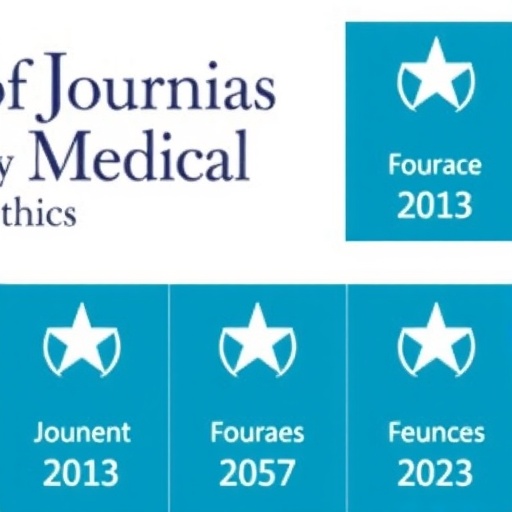The Journal of Medical Ethics (JME), published by BMJ, has been officially ranked as the premier bioethics journal worldwide according to the prestigious 2025 Google Scholar Metrics. This ranking reasserts the journal’s role as the foremost platform for pioneering and influential work in the fields of medical ethics and bioethics. The recognition underscores the journal’s extensive impact on both academic discourse and practical applications, reflecting its critical contribution to shaping ethical standards and debates within medicine and related sciences.
Central to this achievement is the journal’s recent editorial transition, marked by the appointment of Associate Professor Brian D. Earp as Co-Editor-in-Chief alongside Professor Lucy Frith from the University of Manchester and Associate Professor Arianne Shahvisi from Brighton & Sussex Medical School. Associate Professor Earp directs the EARP Lab, a cutting-edge research facility specializing in Experimental Bioethics, Artificial Intelligence, and Relational Moral Psychology at the Centre for Biomedical Ethics, Yong Loo Lin School of Medicine, National University of Singapore. His leadership heralds a proactive phase for the JME, integrating interdisciplinary perspectives and innovative methodologies that address the complexities of modern bioethics.
The journal’s scope encompasses a broad spectrum of ethical issues pertinent to clinical practice, biomedical research, policy-making, and patient advocacy. By critically examining dilemmas that arise in healthcare environments, it provides essential insights for healthcare professionals, ethics committees, scholars, and policymakers. The JME’s commitment to fostering ethical reflection not only promotes responsible conduct in research and medical practice but also influences global standards in healthcare delivery and policy formulation.
The evaluation by Google Scholar Metrics utilizes the h5-index to quantify the influence and reach of academic journals. This metric, which counts the number of highly cited articles over the past five years, offers a robust indicator of a journal’s standing within its discipline. The JME’s ascension to the top of this ranking system illustrates its consistent output of high-quality, impactful publications that resonate across academia and clinical settings internationally.
This accolade comes at a significant moment, coinciding with the journal’s 50th anniversary. Celebrating half a century of scholarship, the JME embodies a legacy of rigorous inquiry and thought leadership in medical ethics. The new editorial team seeks not only to honor this heritage but to propel the journal into a future marked by increased inclusiveness, interdisciplinary engagement, and expanded global reach.
In an open access editorial, the new editors elucidated their vision for the journal. They emphasize the primacy of reasoned argumentation, conceptual clarity, and meticulous engagement with empirical evidence. Their editorial philosophy champions a balanced and rigorous approach, welcoming novel perspectives that challenge prevailing norms and foster constructive debate. This stance is particularly vital in a field where ethical questions intersect with rapidly evolving scientific and technological innovations.
Associate Professor Earp expressed enthusiasm for his new role, highlighting the unique opportunity to collaborate with his fellow editors to sustain and enhance the journal’s reputation. He stressed the importance of maintaining a high standard of scholarship that is both influential and timely. This dedication ensures the JME remains a trusted source for ethical guidance and critical analysis amid ongoing developments in medical science and healthcare policy.
The Journal of Medical Ethics wields considerable influence over policy, practice, and academic inquiry at the nexus of medicine, ethics, and society. Its interdisciplinary editorial team draws from philosophy, law, science, and healthcare, reflecting the multifaceted nature of bioethical issues. Articles published within the journal tackle topics such as biotechnology ethics, human rights, academic integrity, and the societal implications of emerging medical technologies.
Among the journal’s strengths is its commitment to fostering dialogue among diverse stakeholders, including clinicians, ethicists, researchers, and the broader scientific community. This inclusive approach enriches the ethical discourse by incorporating a variety of perspectives, cultural contexts, and methodological approaches. As a consequence, the JME continues to set benchmarks for the field, shaping educational curricula and informing debates on pressing ethical challenges.
Google Scholar Metrics’ emphasis on citation impact underscores the importance of relevance and visibility in academic publishing. The Journal of Medical Ethics’ position at the top reflects its success in disseminating research that not only advances theoretical understanding but also influences real-world ethical practices. This impact is augmented by the journal’s accessibility and engagement with current global health issues and biomedical innovations.
The journal’s editorial leadership recognizes the dynamic and evolving landscape of medical ethics, where technological advancements such as artificial intelligence raise unprecedented questions. The inclusion of experimental bioethics and relational moral psychology in its research focus demonstrates the JME’s innovative approach to addressing these challenges. By integrating empirical studies with normative analysis, the journal fosters comprehensive insights that inform both theory and practice.
Looking ahead, the JME’s editorial team aims to expand the journal’s reach and inclusivity further. This involves encouraging contributions from underrepresented regions and interdisciplinary collaborations that bridge gaps between different ethical frameworks and scientific disciplines. Such efforts will ensure that the journal remains at the forefront of medical ethics scholarship and continues to guide ethically sound decision-making in medicine.
In summary, the Journal of Medical Ethics stands as an essential beacon in the bioethics landscape. Its top ranking in the 2025 Google Scholar Metrics is a testament to its enduring influence, rigorous scholarship, and innovative editorial vision. Under the stewardship of Associate Professor Brian D. Earp and his colleagues, the journal is poised to continue shaping the future of medical ethics globally.
Subject of Research: Medical ethics, bioethics, ethical reflection in healthcare and biomedical research
News Publication Date: 2024
Web References:
Image Credits: NUS Medicine
Keywords: Scientific writing, Science communication, Data availability, Science advocacy, Science journalism, Scientific literacy, Academic ethics, Ethics, Biotechnology ethics, Human rights, Medical ethics




